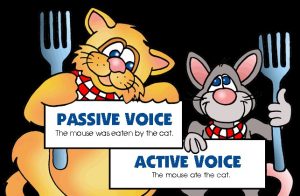The passive voice in English is used to express what is done to someone or something.
Here are a few examples:
The company was sold for $5 million.
That novel was written by Jack Smith in 1912.
My house was built in 1988.
In each of these sentences, the subject of the sentences does nothing. Rather, something is done to the subject of the sentence. In each case, the focus is on the object of an action. These sentences could also be written in the active voice.
The owners sold the company for $5 million.
Jack Smith wrote the novel in 1912.
A construction company built my house in 1988.
What is the difference between Subject and Object?
• If you put the question ‘who’ or ‘what’ before a verb and get a proper reply then the reply is termed as the subject.
• On the other hand, if you put the question ‘who’ or ‘what’ after a verb and get a proper reply, then the reply is termed as the object.
• The subject of an active voice sentence becomes the object of the passive voice sentence.
Choosing Passive Voice
The passive voice is used to place focus on the object rather than the subject. In other words, who does something is less important than what was done to something (focusing on the person or thing affected by an action). Generally speaking, the passive voice is used less frequently than the active voice.
That said, the passive voice is useful to switch the focus from who is doing something to what is being done, which makes it especially useful in business settings when the focus is placed on a product. By using the passive, the product becomes the focus of the sentence. As you can see from these examples, this makes a stronger statement than using the active voice.
Computer chips are manufactured in our plant in California.
Your car will be polished with the finest wax.
Our pasta is made using only the finest ingredients.
Here are some other example sentences that a business might change to the passive form in order to change focus:
We have produced over 20 different models in the past two years. (active voice)
Over 20 different models have been produced in the past two years. (passive voice)
My colleagues and I develop software for financial institutions. (active voice)
Our software is developed for financial institutions. (passive voice)
Using the Agent
The person or people taking an action are referred to as the agent. If the agent (the person or people performing an action) is not important for understanding, the agent can be left out. Here are some examples:
The dogs have already been fed. (It’s not important who fed the dogs)
The children will be taught basic math. (It’s clear that a teacher will teach the children)
The report will have been finished by the end of next week. (It’s not important who completes the report)
In some cases, it’s important to know the agent. In this case, use the preposition “by” to express the agent following the passive structure. This structure is especially common when speaking about artistic works such as paintings, books, or music.
“The Flight to Brunnswick” was written in 1987 by Tim Wilson.
This model was developed by Stan Ishly for our production team.
Passive Voice Structure Examples
Here are examples of some of the most common tenses used in the passive voice:

Passive Voice Quiz
Test your knowledge by Conjugating the verbs in parentheses in the passive voice. Pay close attention to the time expressions for clues on tense usage:
Our house ______________ (paint) brown and black last week.
The project ______________ (complete) next week by our outstanding marketing department.
The plans for the new contract __________________ (draw up) right now.
More than 30,000 new computers _________________ (manufacture) every day at our plant in China.
The children ________________ (teach) by Ms Anderson since last year.
The piece ________________ (write) by Mozart when he was only six years old.
My hair ______________ (cut) by Julie every month.
The portrait _______________ (paint) by a famous painter, but I’m not sure when.
The cruise ship ______________ (christen) by Queen Elizabeth in 1987.
My paper ______________ (deliver) every morning by a teenager on his bike.
Answers:
- was painted
- will be completed/is going to be completed
- are being drawn up
- are manufactured
- have been taught
- was written
- is cut
- will be painted
- was christened
- is delivered
